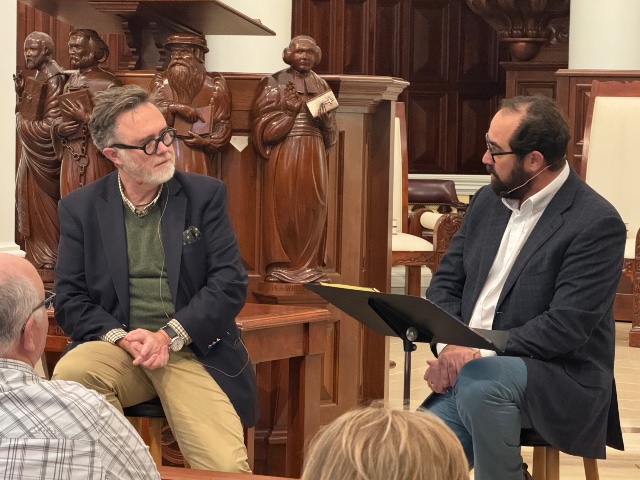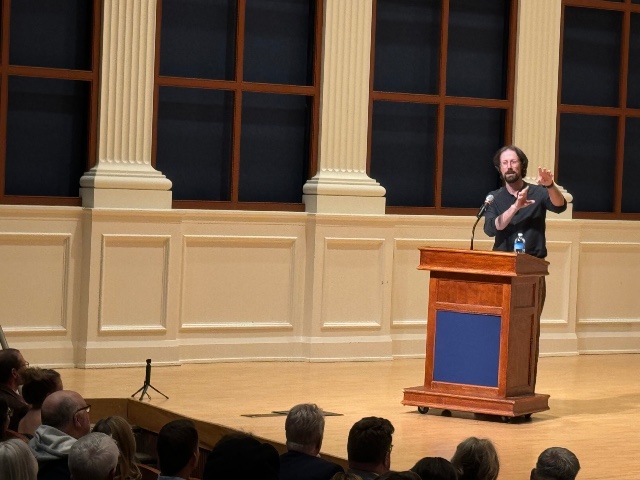
Acclaimed authors Paul Kingsnorth and Rod Dreher spent time at Samford University in recent days, sharing their thoughts on technology and man’s relationship with the natural world and God. Dreher also launched his latest book, "Living in Wonder," at Beeson Divinity School.
Tactical Faith, an organization which aims to help Christians grow in their “wonder and passion for the truth, beauty and goodness of God,” sponsored the events.
On Oct. 18, Kingsnorth was joined by Dreher and Jason Baxter, the director for the Center for Beauty and Culture at Benedictine College, on stage at Brock Recital Hall. Giving a talk titled, “Resisting the Machine,” Kingsnorth described the “Machine” as a cultural force that impacts every aspect of our society, seen through mankind’s continued obsession with progress, control of nature and reliance on technology.
“We are living in the Machine’s world, and we love it, and we hate it, and we fear it all at the same time,” Kingsnorth said. “The Machine is, to its core, anti-limits and anti-form, making it anti-nature and anti-human.”

Kingsnorth said mankind believes we are in control, but are being controlled by the Machine we’ve created, including the smartphone, which he called the “pocket rings of power,” in reference to the villainous force in J.R.R. Tolkien’s “Lord of the Rings” saga.
This dark turn toward “progress” and away from God and what we once valued has even impacted the church, with “robot priests” popping up in Germany and Poland, Kingsnorth said. New “priests” are replacing old priests, paving the way for “new gods,” he said.
“Too many Christians … are naïve about this technology,” Kingsnorth said.
Silicon Valley leaders have admitted they are frightened of the rise of artificial intelligence but feel compelled to bring this force into the world, with some saying they believe there is a higher intelligence found in it, Dreher said.
“We are using our technologies to pursue the direction we’re told not to (by God),” Kingsnorth said.
The march toward “progress” has impacted even buildings. The modern world is strikingly ugly, Kingsnorth said.
“We’re not trying to say anything other than we want more money and we want more growth,” Kingsnorth said.
This isn’t a new story. In the Garden of Eden, man chose to pursue power and knowledge instead of trusting in God, Kingsnorth said.
“It’s still an attempt to make good on the serpent’s offer,” Kingsnorth said. “The force that was wound around the tree calls us to reject God.”
The answer is to repent, he said.
“Draw lines and stick to them,” Kingsnorth said. “It’s easier to do it with other people than on your own.”
While Kingsnorth offered solutions of throwing away smartphones, leaving social media, banning screens at home and in church, he said the lines are up to each person.
Despite what seems to be a bleak outlook, Kingsnorth said he remains hopeful. The Machine, he said, will not win.
“The triumph of the Machine is likely to be its ruin,” he said. “In the words of D.H. Lawrence, the ‘wild swans will fly again over the smoky ruins of iron,’ and all that will attempt of our attempt to build god will be the songs of those who still sing to the true God amidst the smoky ruins, and we will be reminded that all of this passes away, but He endures forever, and the meek, not the machines, will inherit the Earth.”
Dreher Launches New Book
On Oct. 21, Dreher launched his new book, “Living in Wonder: Finding Mystery and Meaning in a Secular Age” at Samford’s Beeson Divinity School. The event was also sponsored by Tactical Faith.
Dreher was joined by Beeson professor Mark Gignilliat in Hodges Chapel to discuss the book, which addresses man’s need to “believe that we live and move and have our being in the presence of God,” and to be reenchanted with the “world of spirit and how it interacts with men,” Dreher writes in the book.
There is a transcendental hierarchy and significance and meaning in all that we do, Dreher said. This was understood in medieval times but has gotten lost with late-stage modernity.
“We can control so much, but we feel so lonely in the world. And we feel disconnected from God,” Dreher said.
The primary audience of the book is for Christians whose spiritual senses have been dulled, Dreher said, but he hopes the book is helpful for anyone, regardless of their religious beliefs.
Man has abandoned a search for truth in favor of “finding what makes us able to live comfortably with doubt,” Dreher said. Instead of life as pilgrimage, modern man just lives a tourist lifestyle, with no meaning or purpose, he said.
“If there’s no intrinsic meaning other than what we get out of it, then there’s no real meaning,” Dreher said.
The most important response, Dreher said, is to know Jesus Christ in a “real and palpable way.”
In the book, Dreher also explores the rise of UFOs and AI, positing these could be demonic forces aiming at pulling people away from God.
“It’s real,” he said. “These are demons that mean us no good. Folks who work in AI believe in them and believe AI can be used a high-tech Ouija board.”
With Dreher coming from an Eastern Orthodox background, Gignilliat offered a thought that the Protestant reaction to certain forms of mysticism is a reluctance of elevating experience to a theological norm. Dreher said while some forms of Protestantism could be seen as “anti-supernatural,” any experience and sense of enchantment has to “be grounded in the traditions of the church and doctrine,” Dreher said.
“If experience is the only standard, anything can be real,” he said.
And for those wanting to “live in wonder,” Dreher said you must be willing to repent, to change your life in response to what you see.
“You can make the search for the enchanted a false spirituality,” Dreher said. “For enchantment to do what enchantment is supposed to do, we have to be willing to sacrifice.”
